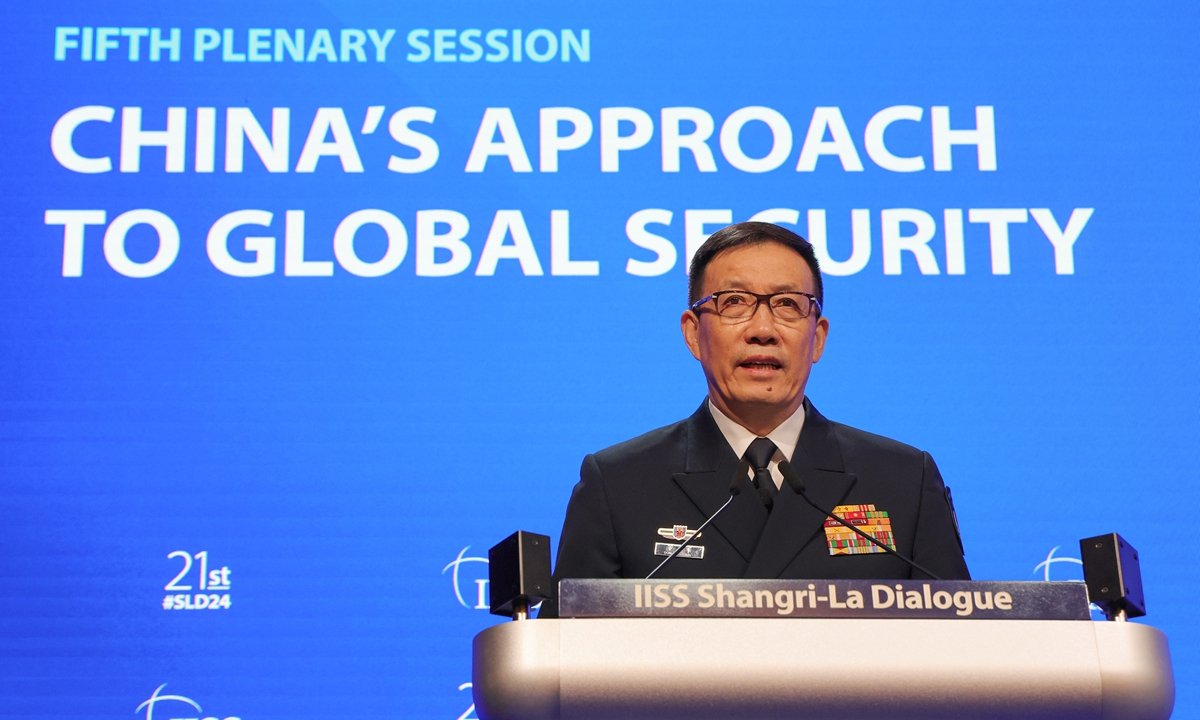At the 21st edition of the Shangri La Dialogue held in Singapore, the new Chinese Defense Minister Dong Jun’s speech has been hailed by Chinese state media as one that calls for peace in the Asia-Pacific region while positioning China as the guardian of that peace initiative.
According to reports, in his first appearance at an international security conference on June 2, Dong Jun, China’s new defense minister, adopted a strong stance toward Taiwan while subtly attacking the Philippines.
While speaking to defense officials and foreign observers at the dialogue, Dong Jun reiterated Beijing’s warnings against Taiwanese independence and lambasted the global backing for it. He said firmly that Beijing would not permit any nation to “create war or chaos” in the Asia-Pacific region.
“Whoever dares to split Taiwan from China will be crushed to pieces and invite their destruction,” Dong said. He said while his country was committed to “peaceful reunification” with Taiwan, the prospect was being “undermined by Taiwan separatists and external forces”.
In response to a question on whether the People’s Liberation Army’s large-scale exercises following Taiwan’s inauguration demonstrated Beijing’s sincere desire for peaceful reunification, Dong accused Taiwan separatists of “unilaterally changing the status quo”. He said Taiwan President Lai Ching Te’s inaugural speech “exposed their ambition” to pursue independence.
Although Dong did not mention the US specifically, analysts said it was evident that Washington was the “external force” he was pointing the finger at. He accused Washington—without naming it—of “pushing Taiwan into danger” and causing problems in the South China Sea in the name of “freedom of navigation.”
China has, on previous occasions, condemned US arms sales to Taiwan and accused it of turning the island into a powder-keg state.

Dong raised “three not allow” in his speech. He said, “We will not allow hegemony and power politics to harm the Asia-Pacific. Nor will we allow geopolitical conflicts, cold wars, or hot wars to be introduced into the Asia-Pacific. Nor will we allow any country or any force to create war and chaos here.”
Following the speech, Dong engaged in a combative question-and-answer session. He declined to address issues regarding Ukraine or allegations that China was “working closely with Russia” or engaging in cyberattacks. Instead, he restated Beijing’s stance about its “core interests,” including Taiwan and the South China Sea.
The Chinese state media has projected the speech as one calling for peace, pitting it against US Defense Secretary Lloyd Austin, calling for “deterrence.”
“Through this speech, the message conveyed by Minister Dong to the outside world can be summarized in one core word: ‘peace’. In the more than 500-word speech information released by the Ministry of National Defense, there are references to ‘peace’, ‘harmony’, and ‘peace is precious’. This is China’s long-standing position and also a response to people living in the Asia-Pacific region who pursue harmony and love peace,” read an op-ed published in Global Times on June 2.
Ironically, while the Chinese have pointed fingers at others and positioned themselves as the guardians of peace in the region, and accused external powers of destabilizing the Asia Pacific, they have simultaneously taken actions akin to explicit aggression against both Taiwan and the Philippines.
China Ups The Ante Against Taiwan, Philippines
In the days before the recently held Shangri La dialogue, China deployed ships in restricted waters near Taiwan’s frontline island Kinmen.
The Taiwanese authorities said its Maritime Patrol Department discovered a suspicious target in Xiamen, China, sailing through the restricted waters of Zhaishan, Jinmen (Kinmen) on May 29. The sea patrols from Taiwan established that the two vessels were Chinese supply ships with a landing craft structure, as reported by CNA Taiwan.
They stated that the vessels were warned and driven out of the restricted waters under Taiwan’s sovereignty. The sea patrol said that due to the poor weather in Kinmen on that day, the window of the dock of the ship PP-10039 was constantly hit by the waves during the expulsion mission. Nonetheless, the Taiwanese vessel continued to shout warnings and drive away the Chinese army supply ship. The ships reportedly sailed for 40 minutes.
Beijing ups the ante. From "normalizing" CCG patrols off Taiwan-held Kinmen, it now deploys PLA Army logistics vessels in those restricted waters. https://t.co/EtgEZv81oK pic.twitter.com/1ld9nXKUKi
— Collin Koh 🇸🇬🇺🇦 (@CollinSLKoh) June 1, 2024
As the incident came to light, security analysts noted that after normalizing the patrolling of waters near Taiwan’s frontline island of Kinmen, China was re-writing rules by sending logistics vessels. The incident has been flagged as another ‘grey zone tactic’ employed by the PLA to intimidate Taiwan, especially as the new President took oath last month.
Taiwan’s coast guard officials announced that two Chinese military vessels passed through the waters close to the Kinmen Islands last week. According to a statement released by Taiwan’s Coast Guard Administration on June 1, the Chinese ships entered “restricted waters” on the southern edge of the islands.
The Philippines reported another aggressive incident against the Chinese Coast Guard (CCG) on June 3. A Filipino official who wasn’t authorized to speak with the media told the Inquirer that the CCG seized and dumped food and other supplies meant for Filipino troops stationed at a remote outpost in the Second Thomas Shoal overboard.
A CCG ship also allegedly blocked the medical evacuation of sick soldiers in another incident that happened at the same location and on the same day.
To ensure the supplies wouldn’t be eaten, the Chinese took hold of some food and supplies and threw them into the ocean. The source claimed that some of them did steal supplies for themselves.
🇨🇳#China – We won't allow any country to stir up trouble in the Asia-Pacific.
Also 🇨🇳China 👇 https://t.co/tr3WXinyLw pic.twitter.com/0Vi11Cs4mD— Ray Powell (@GordianKnotRay) June 2, 2024
The Second Thomas Shoal has recently witnessed several confrontations between the two sides, with Beijing obstructing the reinforcement of the BRP Sierre Madre. The deliberately grounded warship functions as a Filipino military outpost in the region. Both incidents reportedly happened on May 19, prompting the Philippine Navy to conduct an airdrop operation to deliver essential items to the BRP Sierra Madre.
A third incident happened on May 24, when the CCG used water cannons to drive away a Filipino fishing boat near the shoal. This has now become typical of the CCG’s operations in the region. The Philippines Defense Ministry has not yet commented on these claims.
- Contact the author at sakshi.tiwari9555 (at) gmail.com
- Follow EurAsian Times on Google News




